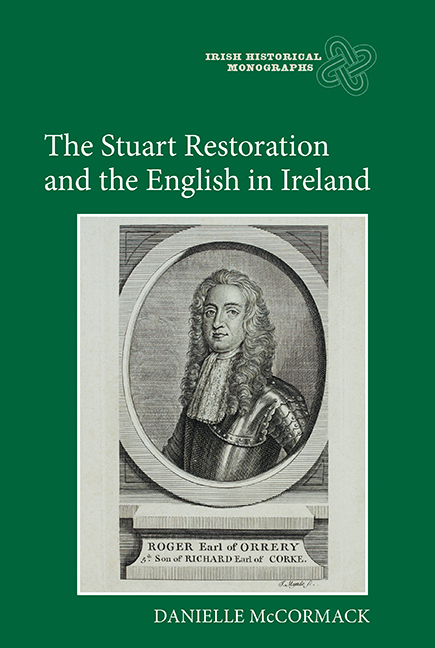Book contents
- Frontmatter
- Contents
- Miscellaneous Frontmatter
- Acknowledgements
- List of abbreviations and conventions
- Introduction
- 1 The political and mental map of 1660s Ireland
- 2 Stuart restoration and the beginnings of Protestant discontent
- 3 Roger Boyle, earl of Orrery, and the evolution of English Protestant identity in Ireland
- 4 Moral and rhetorical challenges to Protestant power
- 5 Charles II and his ministers in Ireland
- 6 The court of claims, popery and Stuart authority
- Conclusion
- Bibliography
- Index
3 - Roger Boyle, earl of Orrery, and the evolution of English Protestant identity in Ireland
Published online by Cambridge University Press: 05 July 2016
- Frontmatter
- Contents
- Miscellaneous Frontmatter
- Acknowledgements
- List of abbreviations and conventions
- Introduction
- 1 The political and mental map of 1660s Ireland
- 2 Stuart restoration and the beginnings of Protestant discontent
- 3 Roger Boyle, earl of Orrery, and the evolution of English Protestant identity in Ireland
- 4 Moral and rhetorical challenges to Protestant power
- 5 Charles II and his ministers in Ireland
- 6 The court of claims, popery and Stuart authority
- Conclusion
- Bibliography
- Index
Summary
Late in October 1662, an anonymous note was delivered through the post to the mayor of Dublin, Sir Daniel Bellingham, intended for the eyes of Charles Coote, earl of Mountrath and other commissioners of the Irish government. It demanded of these worthies that they lobby the king in the Protestant interest. The note pressed for advocacy as follows:
Is your cause so bad that you are ashamed to speak for it, or is there none that will venture to take upon them to be your advocate, when every Papist and Irish rebel can have an advocate to say, or say it himself, that they are not rebels but fought for the King, and that you are rebels and have cut more throats than they?
The urgent tone of this note indicates that the Protestants of Ireland had entered a phase of acute anxiety. Its authors purported to represent all the Protestants of Ireland, including the army, and thus their demand for representation was backed by the threat of force. Evidently, those who composed the note considered that to articulate the justness of the Protestant position was a potential remedy for this insecurity. Protestant difficulty with regard to presenting a coherent case with which to refute claims of returning Catholics to Irish land and power arose from internal Protestant divisions. Old Protestants were more established in Ireland and made the greatest gains from the land transfer of the 1650s. They also benefited from the political favour that Henry Cromwell bestowed on them over New Protestants during his term as lord deputy between 1654 and 1659. However, Protestants were also divided by denomination, as the Old Protestants generally preferred to have an established church and had resented the religious radicalism of the army officers throughout the Interregnum. Attempts to create an inclusive Protestant Church of Ireland quickly faltered, and the restoration church settlement was uncompromisingly Erastian and Episcopalian. This development placed dissenters at a great disadvantage and undermined pan-Protestant unity. The ecclesiastical settlement of Ireland resembled those of England and Scotland in that it did not accommodate the worship or doctrinal preferences of dissenting Protestants.
- Type
- Chapter
- Information
- The Stuart Restoration and the English in Ireland , pp. 46 - 74Publisher: Boydell & BrewerPrint publication year: 2016

